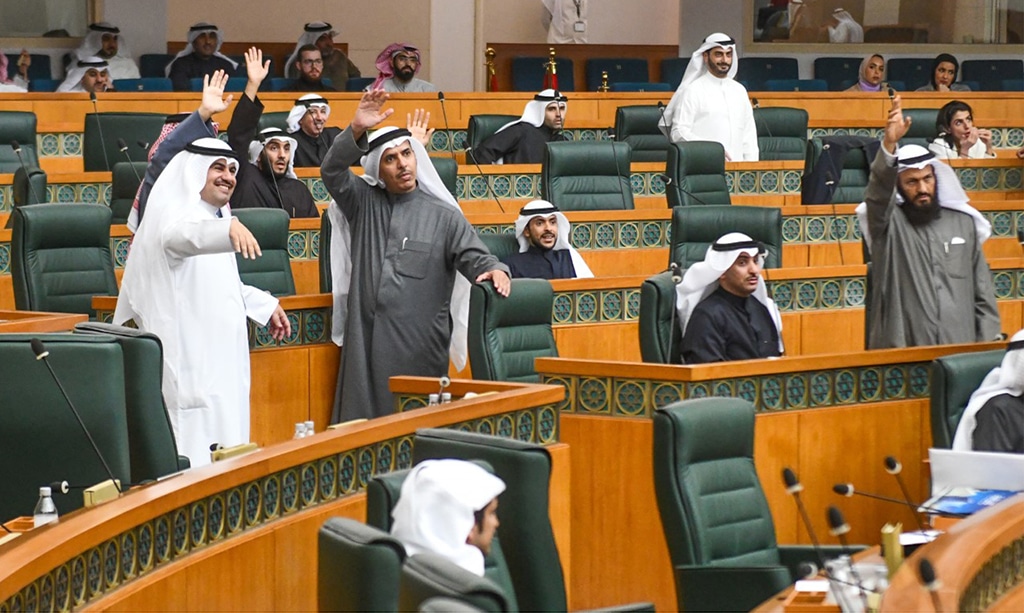By B Izzak & KUNA
KUWAIT: The government presented its four-year program of action based on introducing major political, economic, social and administrative reforms, and providing policies to reduce the number of expats in the country. The government has outlined a meticulous plan aiming to keep national development on an upward trajectory, Finance Minister Abdulwahab Al-Rushaid said on Tuesday, citing clear and well-defined objectives to bring that goal to fruition.
The first "glimpses of reform" are seen in innovative plans based on "diligence and seriousness", the minister told the National Assembly, underlining the need to sort out national priorities and interests as part of efforts to achieve development goals. The best interests of Kuwaiti nationals form the bedrock of the government's plan, he emphasized, saying the success of any plan largely hinges on cooperation between ministers and lawmakers, which is necessary to help the economy flourish.
Addressing the Assembly to explain the government's program, Secretary General of the Supreme Council for Planning and Development Khaled Mahdi said the program aims at introducing reforms in all fields including political, justice, education, economy, manpower, health and others.
He said the program aims at providing homes to 40 percent of housing applicants (more than 40,000 homes) and providing a fairer system for wages and subsidies, in addition to creating more than 30,000 jobs and raising the country's credit ratings. Mahdi added the government is working towards empowering women so that they occupy 30 percent of positions and digitalizing 80 percent of public services. He also said the program aims to raise non-oil revenues in the budget to around KD 3.5 billion from under KD 2 billion now.
The Assembly also passed the conflict-of-interest law stipulating jail terms and hefty fines for ministers, MPs and civil servants who misuse their jobs to make personal gains out of graft. The Assembly also passed a law to add some 18,000 Kuwaiti women, mainly elderly housewives, widows and divorcees to a special health insurance scheme (Afya) for retired Kuwaitis.
Meanwhile, Health Minister Dr Ahmad Al-Awadhi announced a plan to provide short- and long-term solutions to the problem of a shortage of a large number of vital drugs.In a lengthy statement in the Assembly, the health minister acknowledged the problem but he said the ministry has taken a series of measures to provide the drugs as soon as possible. Dr Awadhi said the ministry has introduced controls on the process of dispensing medicines to rationalize their use.
The minister said that he issued a new decision last week to amend a decision issued in 1997 to restrict providing vital and expensive drugs to expats. He however did not say how many drugs have been barred for expats, who pay annual fees to benefit from medical treatment at public clinics and hospitals.
But Dr Awadhi said the best way to ensure that shortage of drugs does not happen again is through manufacturing drugs in the country, adding that Kuwait has the infrastructure to become a center of pharmaceutical industries in the region. He also said that the ministry has formed a committee to probe the reasons for the shortage and find those responsible. The minister said the ministry has asked for a budget of KD 260 million to boost the strategic reserve of drugs and medical equipment and expand storage spaces for medicines.
Kuwait also plans next year to have a direct cooperation agreement with renowned French cancer center institute Gustave-Roussy, the health minister said on Tuesday, without the need to have a "third party" involved. Dr-Awadhi has directly contacted the French institute's public relations chief to discuss the plan, the ministry cited him as saying in a statement, underlining the initiative as an effort to provide quality healthcare services to patients in Kuwait. Such measures also aim to transform Kuwait into a "regional hub" for cancer treatment, added the minister.











